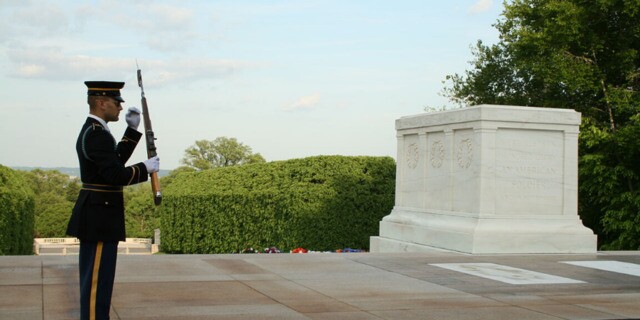Years ago, our family had the opportunity to visit the Tomb of the Unknown Soldier in Arlington National Cemetery near Washington, DC. If you haven’t had that opportunity yet—take it. It’s likely something you will never forget. Overlooking the city, this marble sarcophagus has these words inscribed on the back:
- HERE RESTS IN
- HONORED GLORY
- AN AMERICAN
- SOLDIER
- KNOWN BUT TO GOD1
The Tomb itself is sacred and inspiring. However, there are also guards dressed in spectacular uniform that ceremoniously guard the Tomb 24 hours a day, 7 days a week. The soldiers who guard it undergo a rigorous selection process and an even more rigorous preparation process. They eventually earn the Unknown Soldier Guard Identification Badge, which “is the only military badge that can be revoked for any action that brings disrespect to the Tomb during the lifetime of the Tomb Guard.”2
Watching the actual changing of the guard is impressive. Witnesses to this ceremony are asked to stand and remain silent throughout the ritual. Many will instinctively place their hands on their heart as tears are shed. Such a moment demands our respect. One cannot help but feel greater commitment and loyalty to the nation and its fellow citizens.
Another Sacred Event
The Tomb of the Unknown Soldier reminds me of the ordinance of the sacrament. Each week, we normally have the opportunity to ceremoniously gather together and partake of the bread and water. We are remembering and honoring the ultimate sacrifice made on our behalf. But instead of an unknown soldier, we are remembering the very Son of God and the “agonies of an infinite burden”3 He endured for us.
In essence, the sacrament table is a visual representation of the tomb of the Savior. The clean, white linen cloth is covering the symbols of the body and blood of the Savior just like an ancient cloth once covered His actual body. Priesthood holders are dressed respectfully as they reverently place participants under covenant. Silence and reverence should permeate the ordinance. Instead of observing the changing of the guard, we should be observing the changing of our hearts as we humbly repent and partake of the emblems blessed.
A Commitment of Change
Considering the meticulous preparation, dress, and level of respect from the Tomb Guards, perhaps we could follow their example and do a little better to prepare for the sacrament. Our preparation, dress, and level of respect reflect how we feel about the Savior and show our commitment and reverence for His sacrifice. Elder Jeffrey R. Holland of the Quorum of the Twelve Apostles suggests, “Sunday best has lost a little of its meaning in our time, and out of esteem for Him into whose presence we come, we ought to restore that tradition of Sabbath dress and grooming when and where we can.”4 Arriving on-time, listening to sacred prelude music, and striving not to conduct unnecessary conversations are good starters for ensuring a sacred experience.
After all, the sacrament is not just a renewal of covenants and an opportunity to remember the Savior’s sacrifice, it is the very foundation of our relationship with Him. Remember the famous words of Helaman to his sons, “it is upon the rock of our Redeemer, who is Christ, the Son of God, that ye must build your foundation; that when the devil shall send forth his mighty winds, yea, his shafts in the whirlwind, yea when all his hail and his mighty storm shall beat upon you, it shall have no power over you . . . because of the rock upon which ye are built…”5 The Savior Himself identified exactly how we build upon the rock, how we truly build upon Him. In 3 Nephi 18, the Savior instituted the sacred ordinance of the sacrament among the Nephites. In verse 12, He said, “I give unto you a commandment that ye shall do these things [administer the sacrament]. And if ye shall always do these things blessed are ye, for ye are built upon my rock” (emphasis added). In other words, the ordinance of the sacrament is what truly connects us to our Savior—it’s how we build upon the foundation of Christ.
Remembering and Respecting
In Elder Holland’s April 2019 general conference address, he emphasized the importance of the sacrament. He said, “In addition to making time for more home-centered gospel instruction, our modified Sunday service is also to reduce the complexity of the meeting schedule in a way that properly emphasizes the sacrament of the Lord’s Supper as the sacred, acknowledged focal point of our weekly worship experience. We are to remember in as personal a way as possible that Christ died from a heart broken by shouldering entirely alone the sins and sorrows of the whole human family. Inasmuch as we contributed to that fatal burden, such a moment demands our respect”6 (emphasis added). Whether it is in our home-centered church and a makeshift sacrament table or the finest chapel in the Church, these words from Elder Holland should pierce our hearts as we contemplate the Savior’s Atonement during the ordinance of the sacrament.
Similar to honoring the Tomb of the Unknown Soldier, it is our privilege each and every Sabbath day to honor the Savior’s sacrifice made for us and renew our covenants with Him. How we dress, act and even what we think about is a reflection of how we feel about the sacrifice of the Son of God. It is truly how we build upon Him as our foundation and is “the most sacred hour of our week.”7
Lead image: Wikimedia Commons
- https://www.arlingtoncemetery.mil/Explore/Tomb-of-the-Unknown-Soldier
- https://tombguard.org/tomb-of-the-unknown-soldier/the-tomb-guard/
- https://www.churchofjesuschrist.org/study/general-conference/1985/04/the-purifying-power-of-gethsemane?lang=eng
- https://www.churchofjesuschrist.org/study/general-conference/2019/04/28holland?lang=eng
- Helaman 5:12, https://www.churchofjesuschrist.org/study/scriptures/bofm/hel/5?lang=eng
- https://www.churchofjesuschrist.org/study/general-conference/2019/04/28holland?lang=eng
- https://www.churchofjesuschrist.org/study/general-conference/2019/04/28holland?lang=eng

